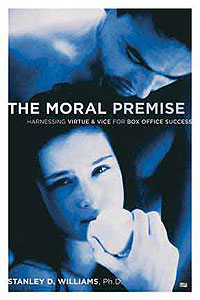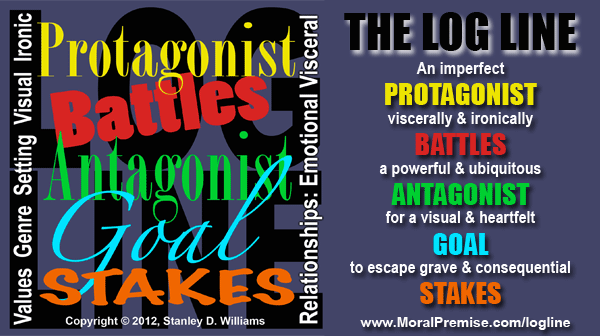
"The most powerful tool in my new tool box."
Will Smith
"A total game changer. The Moral Premise gets your story (and all your characters) working for you, instead of the other way around."
Michael Jann, Sr. Writer, Tonight Show with Jay Leno
"The Moral Premise dares to suggest that movies might actually mean something."
Chris Vogler, "The Writer's Journey"
"Thanks for the great book. I will recommend it to all my classes."
Blake Snyder, WGA, Author "Save the Cat"
"An incredibly practical and helpful tool that should be taught in every film school."
Marianne & Cormac Wibberley, WGA (National Treasure and National Treasure: Book of Secrets)
"Stan, You are a light and an incredible gift! Thank you for your insight and innovation.The Moral Premise: It's Amazing!"
DeVon Franklin, VP, Sony Entertainment
Author, "Produced by Faith."
"Should be required reading, retroactively, for every working Hollywood screenwriter."
Brian Bird, WGA, Producer
"Thank you, thank you, thank you for your wonderful Moral Premise, and for all you've done for me and my writing, Stan."
Tamera Alexander, Novelist
"This is really an important book."
Derek Rydall "The Script Doctor"
"Drop all of your 'to-do' lists, get this book, and curl up for the read of your screenwriting lifetime."
Dave Anderson, President, Compass Film Academy
Aspiring or working screenwriters - I have a tip for you. Buy the THE MORAL PREMISE by Stanley D. Williams and read it twice.
Paul Lalonde, Chairman, Cloud Ten Pictures
"More than a must-read; it is groundbreaking."
Curt LaLonde
More Endorsements >>
|
The Log Line Mug Graphic
Below is a discussion of the Log Line Formula depicted below that also appears on our mugs. CLICK HERE to see the LOG LINE MUG and other writing-aids. CLICK HERE to read the original log line blog post, which gives a prose description.
You can order this mug at the Moral Premise Story Shop.

PURPOSE.
The log line is designed to be one or two sentences that in 30 seconds sell the essence of your story to the customer chain. That customer chain begins with you, the storytellers, and extends to your cast, crew, publisher, distributor, and final audience. The log line keeps you focused in your storytelling, and convinces everyone else to either be involved with you, or experience you've created.
THE EXPLICIT ELEMENTS
(see center of left graphic)
GENERAL COMMENT.
The form on the right, and the graphic on the left depict brightly colored words that are the explicit elements of your log line. Replace ALL of these placeholders with particulars of your story. Do not use proper nouns, but descriptive labels that are direct and clear. Avoid sophisticated or esoteric terms and concepts.
PROTAGONIST.
The character in your story that changes the most, both inside and out. Or, it could be about a myth-like "force of nature" hero (or anti-hero) that changes little but affects a change in every other character in the story.
BATTLES.
The verb that viscerally describes the central physical conflict.
ANTAGONIST.
The character in your story that forces your protagonist to change by exampling the epitome of the vice that the antagonist needs to overcome.
GOAL.
The PHYSICAL "want" that the protagonist must have at all costs.
STAKES.
The terrible physical consequences that will befall the protagonist if the goal IS NOT achieved, or the consequences that will befall or prevail upon the antagonist if the protagonist's goal IS achieved.
THE IMPLICIT ELEMENTS
(see perimeter of left graphic)

GENERAL COMMENT.
Your selection of words for the explicit elements above should IMPLY the following.
VALUES.
The central conflict of dipolar or Nicomachean values with which all the main characters of your story struggle.
GENRE.
Your story's genre.
SETTING.
The era and setting of the story.
VISUAL.
Pick words that indicate your story is a motion PICTURE and not a psychological novel. Pick words that indicate what audiences will SEE and HEAR. Avoid words that imply what happens in the mind, unles you're writing a psychological thriller of a novel....then ignore this.)
IRONIC.
Set up the physical and emotional irony of your story -- i.e. the story's hook. If you devise a good, high-concept hook prior to writing your log line, the elements of the hook should be incorporated into the log line. A hook is the juxtaposition of impossibles or improbables, e.g. a small shepherd boy with a sling battles a giant warrior with a bloodied sword.
RELATIONSHIPS.
At their heart, all successful stories are about relationships. Your log line should indicate what important relationships are at stake in the pursuit of the goal.
EMOTIONAL.
The gut-level motivation of your protagonist's effort.
VISCERAL.
The sharp reality of the stakes and their importance to the human condition. Delivery of your log line should heighten the pulse of your audience.
PERTAINING TO THE RIGHT-HAND FORMULA

REPLACE ALL THE WORDS.
The stacked sentence-formula that begins, "An imperfect PROTAGONIST..." is intended to give you a form to use when you begin to write your log line. ALL OF THE WORDS in the form are intended to be replaced with particular words and phrases for your story. You should start with replacing everything verbatim, word-for-word, phrase-for-phrase. Then, revise, smooth and polish.
|





